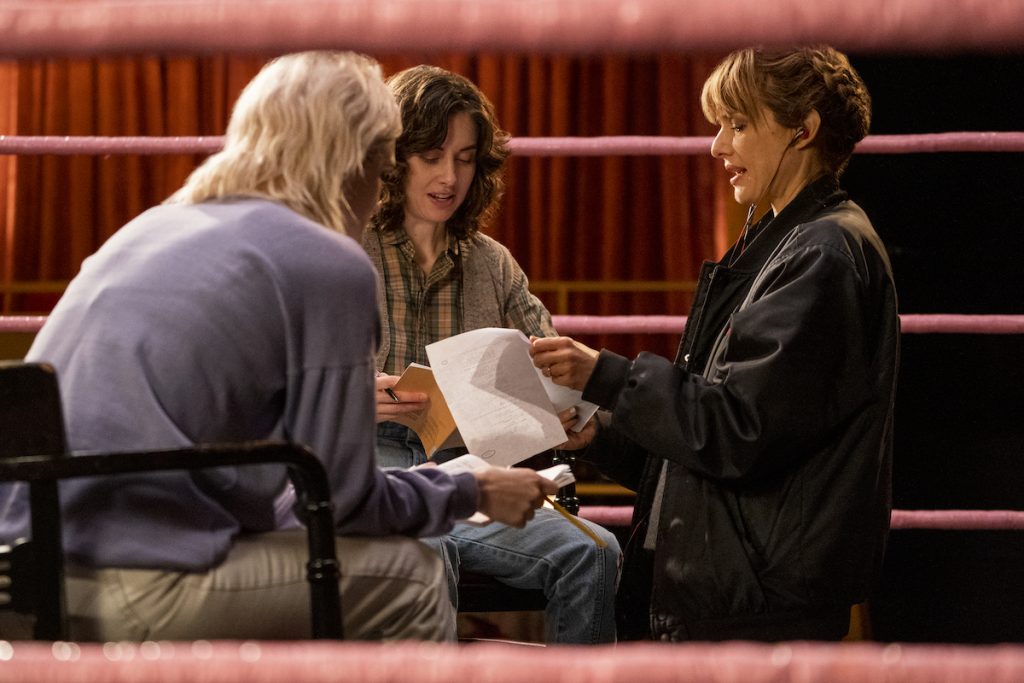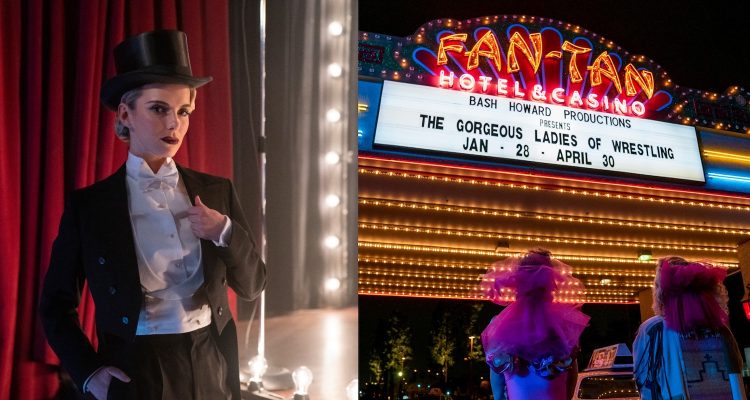For three seasons, Emmy nominated actress Betty Gilpin has brilliantly portrayed actress, producer, and wrestler Debbie Egan / Liberty Belle on Netflix’s GLOW.
Netflix’s critically praised wrestling dramedy is known for its sharp humor and satirization of the sexist views of 1980s Hollywood. However, the real strength of GLOW lies in the grounded, nuanced performances of its versatile ensemble.
Shepherded by Gilpin and costar Alison Brie, the show is at its best when exploring the fractured humanity of its characters and their personal journeys. This year marks the Gilpin’s third consecutive Emmy nomination for Supporting Actress in a Comedy Series.
In season three, the GLOW wrestlers take up a lengthy residency at the Fan-Tan Hotel and Casino in Las Vegas. The girls initially enjoy the glamorous absurdities of Vegas, indulging in all the vices you’d imagine. However, as the weeks turn into months, the nightly performances of the same storyline leave the GLOW ensemble mentally and physically exhausted.
In an attempt to spice up the routine, the ladies swap wrestling characters in “Freaky Tuesday,” one of the series finest moments. Gilpin takes on the persona Zoya the Russian Destroyer while Alison Brie gives her take on the southern heroine Liberty Belle.
The casting of Oscar winner Geena Davis is another welcome addition to the third season. Davis plays the Fan-Tan’s Entertainment Director, giving Gilpin’s Debbie Egan a successful businesswoman to look to in a male dominated field. That’s not to say things are smooth sailing for the wrestler-producer.
Season three pushes Egan to her limits as she struggles with the distance from her newborn son, handling the mounting duties as show producer in the absence of Sam (Marc Maron), and pushing back against the sexist mentality of fellow producer Bash Howard (Chris Lowell) and her businessman boyfriend Tex (Toby Huss).
Ahead of Emmy voting, Awards Focus spoke to Gilpin about the standout moments of season three, balancing her time between GLOW and her feature film The Hunt, and how the cast is handling the loss of director Lynn Shelton as they film their final season.
Awards Focus: I understand you’re back on the East coast with the filming hiatus on season four, how’s that been?
Betty Gilpin: I’m spending a lot of time with my family and siblings in a way that I haven’t since I was thirteen-years-old, which has been nice.
AF: When you wrapped season three, were there any conversations or ideas about where you’d go with the character next season beyond the plotting of taking over a local TV network?
Gilpin: We were actually two episodes into shooting when then shutdown happened, so I knew a bit about where it was going to go. We last left our heroes with Ruth and Debbie in the airport, and Debbie tells her that she stole Tex’s deal and is gonna run the network.
In the new season, we dive in with Debbie starting to run this network. I would say for the first three seasons the girls have treated the wrestling ring like this safe space where they can rehearse their most empowered selves and what that looks like.
Season four is a lot about having that empowered self bleed into their lives outside the ring. For Debbie, it’s becoming a businesswoman.
AF: In the finale, we see Bash in an incredibly emotional state where he admits to Debbie that he’s bisexual and possibly gay, and that moment of honesty takes their relationship to a new level. Obviously, it leads to the new facet of their business relationship where he financially backs the TV network purchase for Debbie to run it… but i feel like they understand each other in a new way, and realize each other’s struggle.
Gilpin: I think Bash and Debbie have an idea of what their lives could look like, but at that time there weren’t out gay men running huge companies or lots of super powerful women CEO’s in the 1980s. Even though they’ve had their differences, that was a moment where they had each other and we’ll see how that works in season four.
AF: Your character had several rich dramatic scenes in season three, one of the most poignant is the painful long distance relationship between a mother and her infant son.
I think about the torture of Debbie getting the VHS cassettes in the mail, which was the only way to see her son’s first steps. Can you talk about that and how Debbie deals with that?
Gilpin: Earlier in the episode, when her ex-husband calls her and says that he took his first steps, I think Debbie sort of let herself fully take that in and understand what a loss that was and how angry she is at herself that she wasn’t there.
I think living in that full capacity of feeling and honesty and vulnerability is not a place that Debbie wants to be. And I think, there’s no place to compartmentalize like Vegas.
And I think once once that VHS comes, I didn’t want it to be another scene where she was standing in front of the TV, sobbing and absorbing the full weight of it. I think she immediately compartmentalizes it and says, “Okay, I can’t process this. I’m going to go make myself throw up like, this is how I’m going to process this.”
Which is heartbreaking, but I think there’s something very controlling and type A about Debbie and that intimidates me. That she’s just able to say like, “I don’t like this feeling. I’m feeling uncomfortable. I’m going to turn it into something else.” We’ve seen it manifest in the way that she’s controlling of Ruth and also controlling of her diet.
AF: When you got to go to the desert canyon and shoot the episode where the girls are trying to reconnect via camping, can you talk about mixing up the studio setting for the outdoors? Was it a nice change of pace?
Gilpin: It feels like our show is this strange little magic camp that only exists in this one confined place. So for us to go shoot in nature, it just felt strange… I felt like what you guys aren’t supposed to exist out here. This is the real world (laughs).
But it was a great change of pace, especially since season three is so Vegas focused and so you know you’re in hotels with recycled air and you don’t know what time of day it is.
Shooting in nature was very conducive to the episode itself, where characters are really letting their inhibitions go and just starting to have tough conversations that they maybe wouldn’t have in a hotel room.
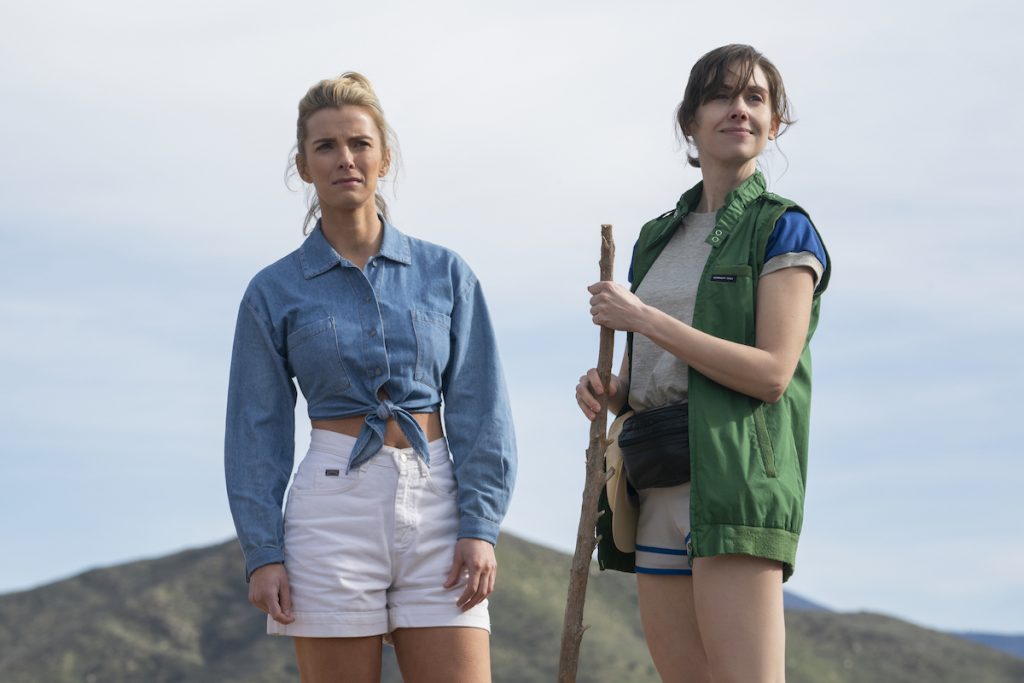
When Alison and I are on the rock and it’s dark, it was so cold. I could not believe how cold it was and of course we barely had anything on in terms of holding body heat… like a square of Canvas and a square of denim. It was like some high stakes X Games acting there (laughs).
AF: With GLOW, you’ve got so much physical exertion in the performance element inside the wrestling ring, and then the other half of the episodes are dramatic scenes. I’m very curious when it comes to shooting, how does the approach differ inside the ring?
Gilpin: Everything in the ring is complicated. A scene over coffee or a meal is simple coverage, but a wrestling ring is open on four sides. There’s overheads, wide shots, steady cams going in the ring.
It takes a really long time to get those shot. When you look at wrestling as a sport, it’s really meant to be one match for about 20 minutes and the wrestlers go sit in an ice bath.
On GLOW, we shoot sixteen hour days and youo really have to figure out how many suplexes you have in you. if I’m blurry in the background of a shot, that’s a good time to let the stunt double do the move. When it’s clearly me, then I’m the one in the shot. The show is so much fun and so insane, it feels like we’re on three different shows at once.
AF: In the episode “Freaky Tuesday,” the GLOW actresses decide to flip their roles to break the monotony of their nightly routine. For you, how did you enjoy playing Zoya and seeing Alison Brie play Liberty Belle? Was there a sense of ownership to the role?
Gilpin: it was a lot of fun. I mean, I have to admit I was nervous about it at first because you never know when you’re going to feel sensitive about something or someone else is going to feel sensitive about something.
As actors, we’ve owned these characters for years now. I wasn’t feeling protective of Liberty Belle, but I was feeling nervous to do Zoya. The character is so Allison and it just felt almost sacrilegious for me to do it. Alison kept teasing me,“Why are you nervous about this?”
When we were rehearsing the actual wrestling moves, I would just do my own American accent as Zoya running the lines. Alison finally said, “Why aren’t you doing the (Russian) accent?”
Then I started doing it and we kept going more and more over the top with it… when you’re in the ring and the cameras are rolling and you know, all those people are yelling, even though the audience is filled with paid actors, your brain says, “I’m on!”
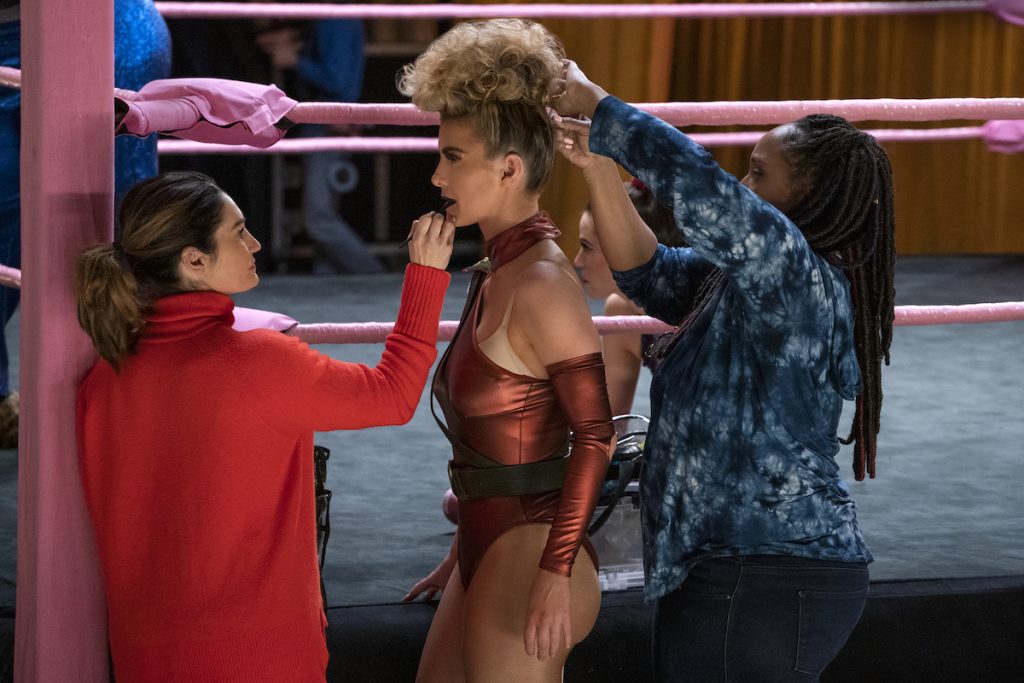
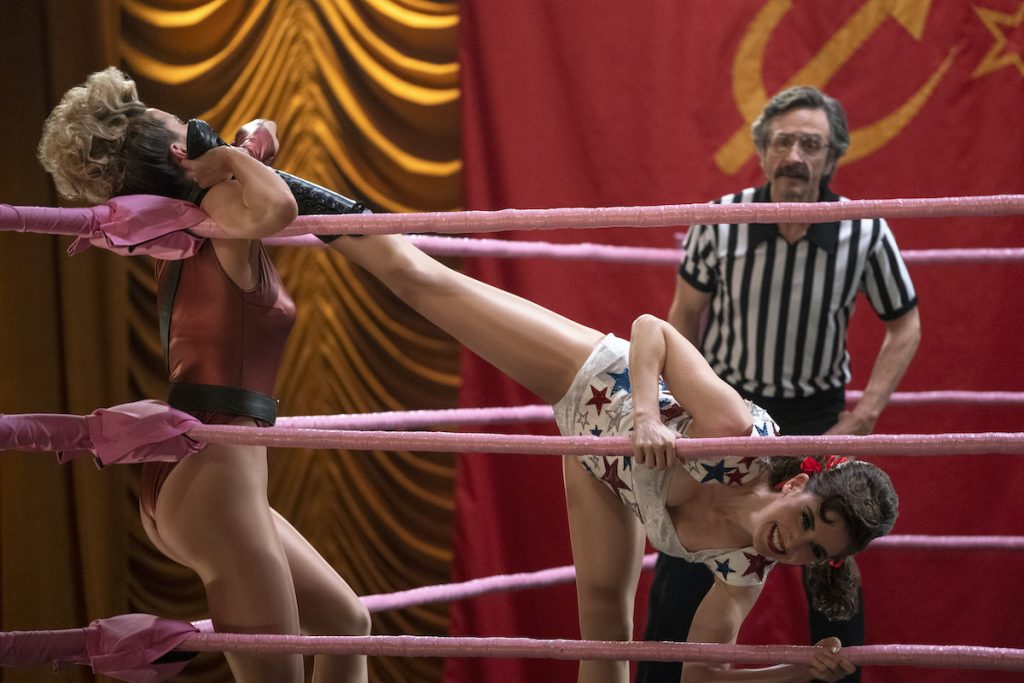
AF: When it came to the A Christmas Carol inspired season finale, were you upset that you were the narrator and out of the action of the ring, or relieved?
Gilpin: I was so relieved because I was shooting the movie The Hunt, and it it overlapped with the last two weeks of GLOW. During episode nine they let me go to New Orleans to start shooting the film, which was a very stunt heavy movie. At the time, I was aware that episode ten was going to be a big wrestling episode.
I kept waiting for that script thinking, “Oh, please God, I think if I’m in a wrestling match it will kill me.” The training for that movie was so intense, and when I got word I was the narrator and not wrestling I sobbed in relief.
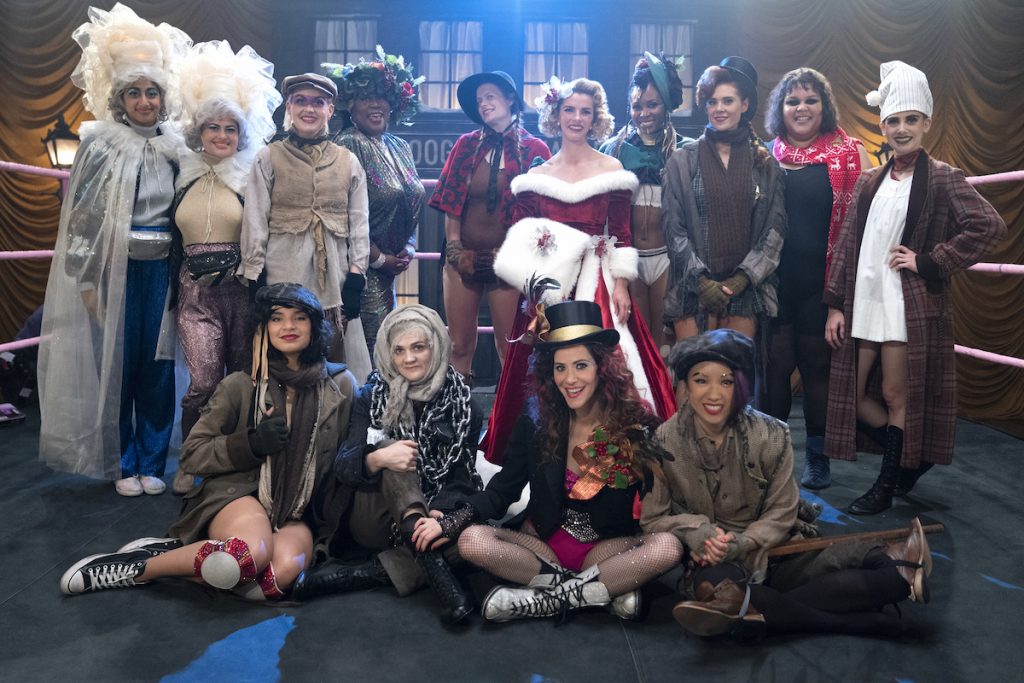
AF: One of the staples of GLOW has been a recurring group of directors, and one of those was Lynn Shelton. Her passing was a real shock to everyone and a great tragedy. In terms of season four, how is everyone in the casting dealing with the grief amid the strain of the pandemic?
Gilpin: When Lynn passed we were already separated because of the shutdown, but we’ve been talking about her tons on the phone. She directed five or six of our episodes and we all feel that she was a founding partner in finding the weird and specific tone of the show.
There’s certainly a circus element to our show and humor, but Lynn treated it like Mad Men, grounding it in drama and the humanity of the people. She just had a real acute understanding of the human condition, which you see in her movies and other television work.
